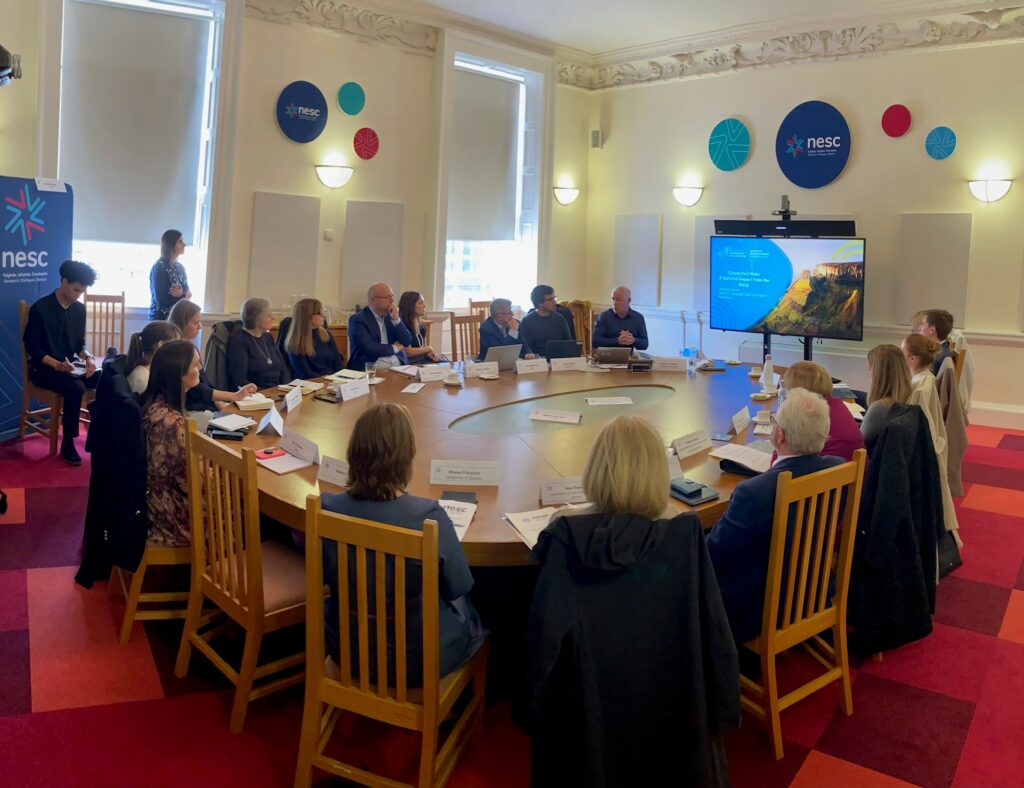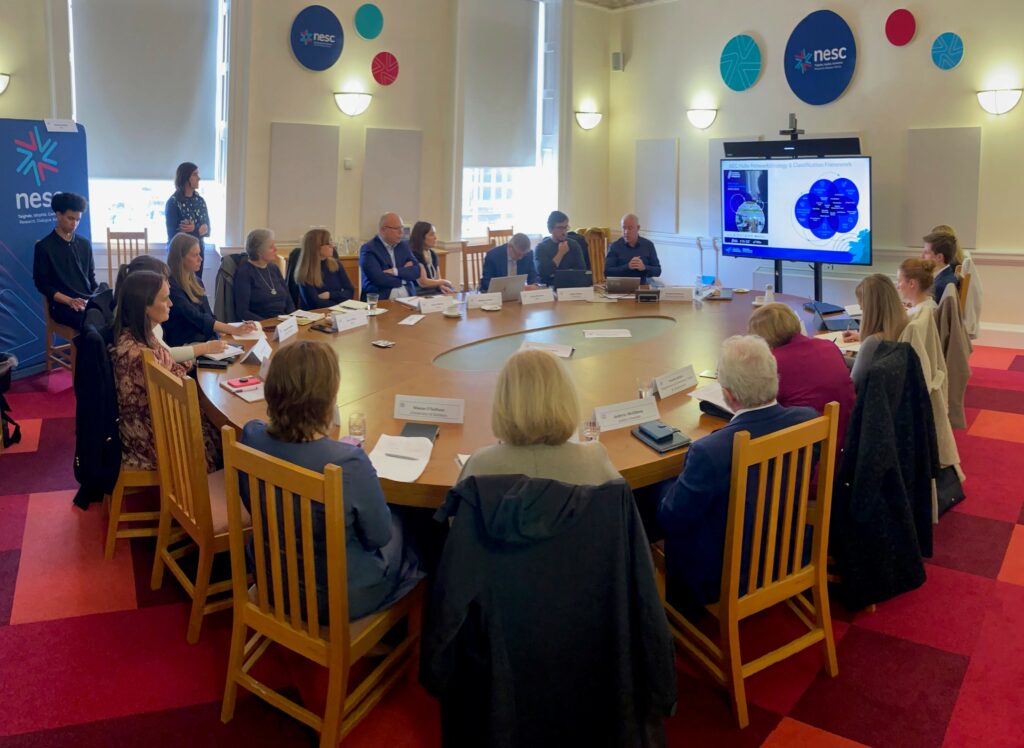You are here: Home > Our Work > Facilitate and Support Policy Making and Societal Engagement
Facilitate and Support Policy Making and Societal Engagement
Engagement and helping deliver projects via support for specific projects in government departments, agencies, or government sponsored initiatives forms the basis of our third strategic outcome.
This outcome helps raise awareness of the role and expertise of NESC as a resource to support problem-solving and deliberation across the policy system.
Additionally, this strategic outcome includes engagement with EU partners and the international community on current and emerging policy areas.
Annual Meeting of the Presidents and Secretaries-General of the European Economic and Social Committee and of the national Economic and Social Councils
NESC is preparing to host the Annual Meeting of the Presidents and Secretaries-General of the European Economic and Social Committee and of the national Economic and Social Councils in November 2026. This two-day event will form part of the official agenda for Ireland’s Presidency of the European Union. Meeting in the prestigious surroundings of Dublin Castle, the Presidents and Secretaries-General will discuss research and policy options to build Social Cohesion collectively and within their own countries. This will be followed by a high-level conference where Irish and international speakers will share research, insights, and experiences of Social Cohesion – what builds it, what breaks it, and how to move forward together.
The Evolution and Impact of Remote and Hybrid Working in Ireland
Prior to the outbreak of Covid-19 approximately 14 per cent of employees in Ireland worked at home in some capacity. The introduction of public health restrictions in early 2020 to curb the pandemic changed this situation swiftly and dramatically as almost overnight millions of employees in Ireland and across the world were forced to work from home. As restrictions were gradually lifted many workers who had been working exclusively from home started to return to the workplace intermittently. At the same time the experience of remote working, in conjunction with the availability of technology that supported it, facilitated an increased focus not just on remote work but also on the role of hybrid working whereby work is carried out both from the workplace and from home.
Recent data from the Labour Force Survey indicates that approximately 37 per cent of those in employment worked from home for at least some of the time in Q1 2025. The scale and pace of this transformation in the both the organisation of work and how work is performed indicates that this is an important issue for the Council to explore. This project will seek to provide a deeper understanding of the evolution and impact of remote and hybrid working in Ireland since 2020. It will also consider some of the associated labour market trends and developments from an all-island perspective.
In summary the key research objectives of the project are to:
- assess the evolution of and characteristics of remote and hybrid working in Ireland;
- analyse the advantages and disadvantages of remote and hybrid working for employees and employers;
- consider the extent to which these impacts vary depending on the characteristics of the worker or employer in question;
- explore the impact of remote and hybrid working on productivity;
- examine the consequences of remote and hybrid working for the Irish economy, society and environment; and
- seek to identify the public and organisational level policies and actions that can best maximise the benefits of remote and hybrid working for all stakeholders while also mitigating the associated challenges.
A Council Working Group has being established to act as an advisory and oversight body to this research project. This group is comprised of representatives from each of the Council pillars, in addition to nominated individuals with relevant experience and expertise on the issue. The group held its first meeting in NESC offices on Thursday 25th September, with four more to come over the next few months; please see below for some photos taken on the day.


Covid-19 Evaluation
Niamh Garvey provided some technical analysis support to Ireland’s Independent Covid-Evaluation throughout 2025. One of the programme of work areas was an opportunity for people in Ireland to share their experience of the impacts of Covid-19 and the response. NESC supported the design of the public survey – including through provision of a paper analysing existing research on the impacts of Covid-19 in Ireland; and will also analyse the results of the public survey.
Health Dialogue Forum
In 2025 Damian Thomas was asked to undertake a review that will assess its impact to date of the work of the Health Dialogue Forum.
The aim of the Dialogue Forum is to build a stronger working relationship between the State and the voluntary healthcare sector for the benefit of patients and service users, as well as to facilitate regular dialogue with the voluntary sector on future policy and strategic developments.
In particular, this review will:
- Examine the evolving relationship between the State and the Voluntary healthcare sector;
- Assess the impact of the Forum and consider how it can be further developed, especially in the context of the new regional engagement structures; and
- Examine the collaborative approach that has been undertaken with regards to the following key initiatives, in particular:
- The Service Arrangement and Grant Aid Agreement (SAGAA) Review; and
- The Health Regions restructuring process.
This project builds on earlier work carried out by the Dialogue Forum and work from NESC that resulted in a Secretariat paper Building a New Relationship between Voluntary Organisations and the State in the Health and Social Care Sectors: Paper for the Dialogue Forum with Voluntary Organisations.
More information on the work of the Covid-19 Evaluation is available here.
Housing Commission
Dr David Hallinan was seconded to the Housing Commission from May 2023 until May 2024. Together with a secondee from the Housing Agency, David was tasked with supporting the members of the Commission in the preparation, development and completion of the Commission’s report. David also assisted in facilitating Commission meetings and providing research support to Commission members.
More information on the work of the Housing Commission is available here.
Child Poverty
Anne-Marie is working on secondment to the Child Poverty and Well-being Programme Office in the Department of the Taoiseach. Her key responsibilities include advising on how to address child poverty in the annual Budget, supporting greater integration of services for children, advising on data to monitor on child poverty, and providing advice to the policy system on issues related to child poverty. She has designed and produced the reports analysing how Budget 2024 and Budget 2025 addressed child poverty.
More information on the work of the Child Poverty and Well-being Programme Office is available here.
Land Use Review
Niamh Garvey previously engaged in Phase 2 of the Land Use Review, launched by Minister Ryan (Environment, Climate and Communications), Minister McConalogue (Agriculture, Food and the Marine) and Minister of State Noonan (Heritage and Electoral Reform).
Phase 1 of the Land Use Review focused on evidence gathering and was completed in 2023. The second phase aims to identify the key demands on land (both public and private) in order to inform policies for land use across key government objectives including improving socioeconomic, climate, biodiversity, water, and air quality outcomes.
NESC is a member of two of the working groups that have been established to support the review: a technical working group (chaired by Mark Scott, Professor of Planning and Dean of Architecture, Landscape Architecture, Planning and Environmental Policy in UCD) and a citizen engagement working group (chaired by Rory O’Donnell, retired Director of NESC), which will inform and engage stakeholders in the land use review process. As part of the citizen engagement working group, NESC has led the research into innovative place-based initiatives and the lessons that can be learned for informing Ireland’s future land use governance.
